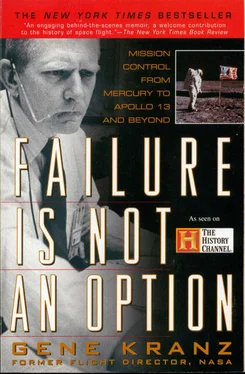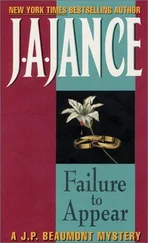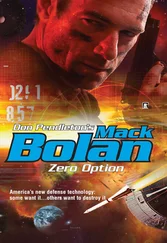Monday morning, I told Hodge I was calling a meeting of my branch and my flight control team in the auditorium. Hodge, deeply disturbed by the fire and still searching for his own answers, agreed and expanded the meeting to include the civil servants, Philco controllers, and our spacecraft contractors.
The auditorium in our office area held 250 and was half full when John and I arrived. The controllers were still in the bewildered state they had been plunged into on Friday night—muted and somber, feeling, as I did, that we had failed our crew, but not knowing what to do about it. Hodge spoke first, citing the known facts of the accident, then describing the newly appointed review board and the investigating team headed by the director of the Langley Research Center, Floyd Thompson.
I recognized a few of the Thompson committee members. Frank Borman, the Gemini astronaut, and Max Faget, the director of engineering, were from MSC, and John Williams was from the Cape launch team. When Hodge completed his briefing, I still did not know what I wanted to say as he motioned me to the microphone. Emotionally I had come out of the shock, and my feeling now was one of pure anger. Anger that we in Flight Control in some way had let the crew down.
I climbed the four steps to the stage, looking at all those faces of people I knew so well. I wanted them to get beyond shock, then say, as St. Peter did in one of his epistles, “Let us get good and angry—and then let us make no mistakes.” Yes, we had experienced a terrible tragedy and a devastating setback, but this was not the end. The testing and the program would go on and we were the ones who would carry it forward. It was up to us to make sure that the Apollo 1 crew had not died in vain.
I started talking about my feelings, and the words finally poured out. I didn’t quite know where they came from, but I spoke slowly, deliberately, and with conviction. “Spaceflight will never tolerate carelessness, incapacity, and neglect. Somewhere, somehow, we screwed up. It could have been in design, build, or test. Whatever it was, we should have caught it.
“We were too gung ho about the schedule and we locked out all of the problems we saw each day in our work. Every element of the program was in trouble and so were we. The simulators were not working, Mission Control was behind in virtually every area, and the flight and test procedures changed daily. Nothing we did had any shelf life. Not one of us stood up and said, ‘Dammit, stop!’
“I don’t know what Thompson’s committee will find as the cause, but I know what I find. We are the cause! We were not ready! We did not do our job! We were rolling the dice, hoping that things would come together by launch day, when in our hearts we knew it would take a miracle. We were pushing the schedule and betting that the Cape would slip before we did.”
My remarks were received with silence, no movement, no shifting in the seats. The controllers, each and every one, knew what I meant. I was just putting their thoughts into words.
“From this day forward, Flight Control will be known by two words: ‘Tough and Competent.’ Tough means we are forever accountable for what we do or what we fail to do. We will never again compromise our responsibilities. Every time we walk into Mission Control we will know what we stand for.
“Competent means we will never take anything for granted. We will never be found short in our knowledge and in our skills. Mission Control will be perfect.
“When you leave this meeting today you will go to your office and the first thing you will do there is to write ‘Tough and Competent’ on your blackboards. It will never be erased. Each day when you enter the room these words will remind you of the price paid by Grissom, White, and Chaffee. These words are the price of admission to the ranks of Mission Control.”
The specific cause of the Apollo 1 fire was never identified, but the conditions that led to the fire were clear. We had a sealed cabin, pressurized with oxygen. There were extensive combustibles in the cabin, including a lot of explosively flammable Velcro. The wiring and plumbing systems were vulnerable to damage and, in retrospect, we made the wrong hatch design tradeoffs. It is easy to see all of this in 20/20 hindsight. Like so much in technology, there was a necessary tradeoff. The hatch was a two-piece design. The exterior opened outward while the interior pressure hatch opened inward. It was a brute, heavy and awkward. Given the design, a rapid escape from the spacecraft was impossible. But the NASA and North American designers hadn’t been as worried about escape contingencies as they were about the possibility of a hatch popping open into the vacuum of space or another inadvertent opening during a water landing. The premature opening of Gus Grissom’s Mercury hatch and the loss of his capsule was a lesson not easily forgotten.
A fire on the ground was considered such a remote possibility that the cabin contained no extinguisher. Even if there had been one, it probably would not have worked quickly enough in a time frame of a few seconds. Today’s Halon gas full-flood system might have worked. The fire involved a pure-oxygen cabin atmosphere, flammable materials, and an ignition spark from somewhere in the spacecraft. Before we could fly again, we had to eliminate one or more of these elements in the interior of the spacecraft. Everyone—designers, launch team, MCC, and even the crew—had not given enough thought to what an oxygen-rich atmosphere could do, particularly in a cabin stuffed with flammable material.
I worked with the controllers, assembling the data for the Thompson committee. After putting the data together, I listened for the last time to the final minutes of the plugs-out countdown. We took all the tapes and other records—everything from MCC and the Cape—and shipped them up to the investigating committee.
As we fought back from the tragedy, Tough and Competent joined with Discipline and Morale in defining the culture of the controllers. These words became our rallying cry. The controllers gave me a T-shirt with the words stenciled across the chest. I was proud of their gift and proud to wear it. The ultimate success of Apollo was made possible by the sacrifices of Grissom, White, and Chaffee. The accident profoundly affected everyone in the program. There was an unspoken promise on everyone’s part to the three astronauts that their deaths would not be in vain.
At the time of the accident, every element of the program was in trouble. The command and lunar modules were behind schedule, the software was late, and the systems were often failing during testing. The Saturn had had problems also. The second-stage (S-II) rocket was an engineering and production nightmare. After a second S-II explosion, in ground testing, there were some contractor changes at the production and test facilities. There were recriminations, but no excuses.
Engineers were having difficulty moving the leading-edge technologies from the laboratories to the production line. At North American and in the U.S. Congress, the report written by General Sam Phillips before the fire raised questions about competence, quality, and workmanship by the manufacturer. If they sneezed, we caught the flu. Every spacecraft design change triggered more changes in Mission Control and in the simulators. The traffic piled up and engineers found they were making changes on changes.
By late spring, however, the program emerged from the chaos of the fire. Momentum began to build again.
In March 1967, the mission designations were changed. After the Apollo 1 fire, there would be no Apollo 2 or 3. Two unmanned Saturn IB flight tests—AS201 and 202—were not redesignated with a sequence number. The next mission after those two Saturn IB flights was designated Apollo 4, the first flight of the Saturn V. For our own internal purposes, mission types were given letter designations. The controllers preferred this letter sequence since it denoted the broad objectives and was used in lieu of numerical designations.
Читать дальше












